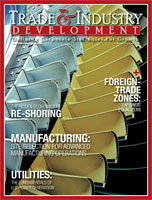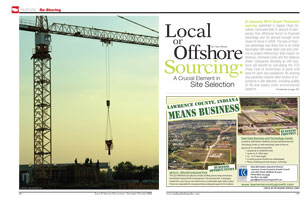Re-Shoring
A January 2010 Grant Thornton survey, published in Supply Chain Solutions, concluded that 51 percent of companies that offshored found no financial advantage and 20 percent brought work closer to home in 2009. The lack of financial advantage was likely due to an initial fascination with lower labor cost and a failure to project offshoring’s total impact on revenue, overhead costs and the balance sheet. Companies deciding on site locations will benefit by calculating the TCO (Total Coat of Ownership) of parts and tools for each site considered. Re-shoring also positively impacts other factors of importance in site selection, including quality of life and supply chain environmental footprint. more....


